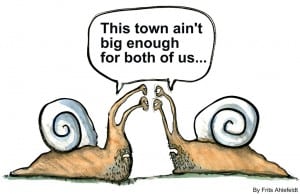If you look back through various writings, these two terms, entrepreneur and small business owner, were once considered the same thing. Yet today business schools and economic/community developers often view them differently. More often the focus is on entrepreneurial development with fewer programs having “small business” in the title.
Yet one often wonders are they different and, if so, do they indeed provide different returns to a community?
Entrepreneurs, by definition, are viewed more as planners and innovators with a higher achievement motivation and a greater tolerance for risk. Small business owners, on the other hand, are viewed as focused more on life-style and oriented towards slower growth. So from that basic outline, one might argue that indeed entrepreneurship growth should be a goal for economic development.
Looking at what has been written about the topic does not clear up the picture. At one time everyone was considered a small business owner. Consider the U.S. Small Business Administration or look at census data. The number of entrepreneurs aren’t counted; instead it is the number of small businesses. There are many reasons for that with trying to distinguish the two just one of the issues. Yet recent writings show a definite growth in interest in entrepreneurship development.
Yet it usually isn’t just an either/or situation. For example, where each business is in its growth pattern must be considered. Few businesses begin with what we have come to view as the entrepreneurial model – rapid growth in terms of employees, revenue (but not always), and visibility. Instead, those measures happen somewhere after launch but often in the somewhat early stages. But not all businesses, actually most of them, will not ever hit that period. They may grow but often it is in a slower, steady pattern versus the explosive growth period.
But back to the question of what type of business development programs should a community looking towards the future have in place?
Based on some preliminary work a colleague and I have done, we might suggest a community needs to support both equally. Our work looked at the same businesses over a 10-year period.
Our work noted that it is possible to distinguish between the two groups. And, at the beginning, entrepreneurs had greater revenue and more employees. Yet, our study just happened to coincide with the beginning of the recent recession, at the end of ten years small business owners were substantially less affected than were those we labeled entrepreneurs. Revenue grew slightly and the number of people employed remained stable.
So what does this mean in terms of a community’s economic development activities?
My basic recommendation would be to leave no one out. I say that for two reasons. First as already noted, nothing can predict who the next rapid growth firm, or gazelle, will be. Second, small businesses provide stability to the economy meaning a smoother growth pattern overall.
There are lots of other reasons why supporting all business growth just makes sense for a community. The key though is that communities get programs in place and ensure the programs keep going.
Growing a business does not happen with only one infusion of information. Businesses happen with constant learning, mentorship, and community support.











